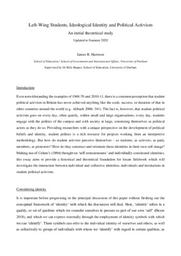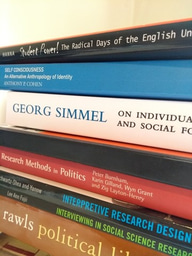It is indisputable that life in general has become easier for LGBT+ people in many parts of the world, even in the last twenty years. For current undergraduate students, it is difficult to imagine the challenges and discrimination suffered by LGBT+ people, even into the early years of the 21st century.
Notwithstanding this fact, there is still a great distance to go for the LGBT+ community, even in the UK. In 2018, the Government Equalities Office reported that LGBT+ individuals are on average less satisfied with their life than the population as a whole, and are more likely to be the victim of all kinds of crime.
It is unacceptable that 2% of respondents to the GEO's LGBT+ survey in 2018 had experienced the unethical practice of conversion therapy. It is unacceptable that only 3% of respondents had discussed sexual orientation or gender identity at school. It is unacceptable that, as recently as 2017, only one CEO of a FTSE 500 company was openly LGBT+.
Clearly, change is still necessary. And we, as Laidlaw Scholars, are making it our mission to be at the forefront of this change as next generation leaders across all sectors of society.
As much as conditions have improved, LGBT+ people still face unique challenges in the workplace. Especially in the positions of leadership to which Laidlaw Scholars should be aspiring, LGBT+ people are still underrepresented.
LGBT+ Laidlaw would allow Laidlaw Scholars who identify as LGBT+ to socialise with one another, share their experiences, support one another and even get involved in mentoring schemes with LGBT+ Laidlaw alumni and/or established LGBT+ leaders in the world.
A support network for LGBT+ Scholars and alumni has the potential to help Scholars enter the working world more confident in themselves and their identity. The opportunity for LGBT+ alumni to mentor current Scholars is extremely important: it's critical that LGBT+ Scholars see that they can aspire to leadership positions in any field they desire, and that alumni have already proven that this is possible. This would also give alumni the opportunity to give back to the Laidlaw programme and pass on their expertise.
A network of LGBT+ Scholars and alumni would also be a valuable social opportunity: it is important to build a community in which LGBT+ Scholars can get to know people with similar experiences and stories, and where they can form meaningful connections.
LGBT+ Scholars also have a lot to learn from each other's experiences: the challenges and experiences of LGBT+ people vary massively across the settings of the different institutions hosting Laidlaw Scholars, from Rwanda, to Singapore, to Durham. Understanding each other's experiences offers a real opportunity to expand Scholars' horizons and explore a new perspective on being a global citizen, a next generation leader and an LGBT+ individual in today's world.
It is important that Laidlaw Scholars know that they are part of a community where they can be themselves and which accepts everyone for who they are. Hopefully LGBT+ Laidlaw can play a minor but important role in making sure that this is indeed the case.





Please sign in
If you are a registered user on Laidlaw Scholars Network, please sign in